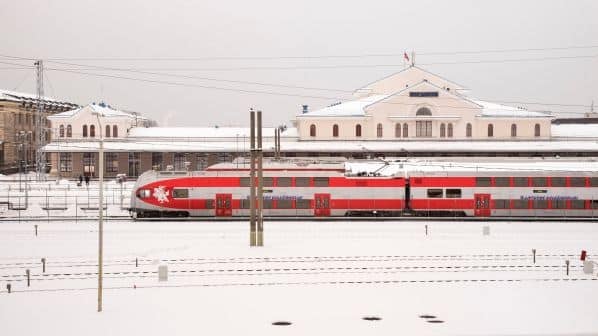ABB has won a contract for the supply of a 25kV ac electrification system for the Vilnius - Klaipeda line in Lithuania. All electricity for the line will be sourced from renewables.
The line upgrade project is being delivered by a joint venture partnership between Elecnor and Inabensa under a contract worth €350m signed with Lithuanian Railways in December 2019, and which is partly funded by the EU Cohesion Fund. The contract is the first deployment of ABB’s traction switchgear technology in Lithuania and is also ABB’s largest ever 25kV rail electrification order in the European Union (EU).
The project forms part of a strategy to electrify 39% of Lithuania’s total rail network by 2030, with 8% so far electrified. The aim is to ensure greater interoperability with the wider EU rail network, where the extent of overall electrification is currently estimated at 56%.
The electrification contract will cover a total length of 730km of track and will complete the electrification of the busy line between the capital and Klaipeda, which is a Baltic seaport.
ABB will design and supply 25kV ac equipment packages for six 110/25 kV traction substations, eight autotransformer stations and three sectioning posts.
To ensure there is a reliable and safe power supply, ABB will install its railway ZX1.5-R medium voltage gas insulated switchgear (GIS). This is modular in design and uses 70% less space than many conventional products. It is also easy to install with no gas handling on site and features a ‘sealed for life’ installation panel for minimum maintenance, leading to reductions in total investment and operational costs.
ABB will also custom-build six variations of its Structure Mounted Outdoor Switchgear (SMOS) which it says integrates all the elements needed to safely protect and operate the supply sections of overhead line and is built to withstand arduous conditions while being easy scaled to facilitate narrow, restrictive environments
Once the electrification contract is completed, it is estimated that the rail line will be used by more than three quarters of all freight and two thirds of rail passengers in Lithuania and will contribute to increased competitiveness of rail transport, reduced costs of operation and economic benefits from reduced pollution that could amount to as much as €1bn in overall cost savings for Lithuania.
“Our technology will ensure a reliable, safe and efficient service while delivering sustainable mobility for the millions of passengers and freight who use this line every day,” says ABB’s global railway marketing and sales manager, Mr Antonio Colla. “Lithuania is now well on track to electrify over a third of its rail network by 2030.”

